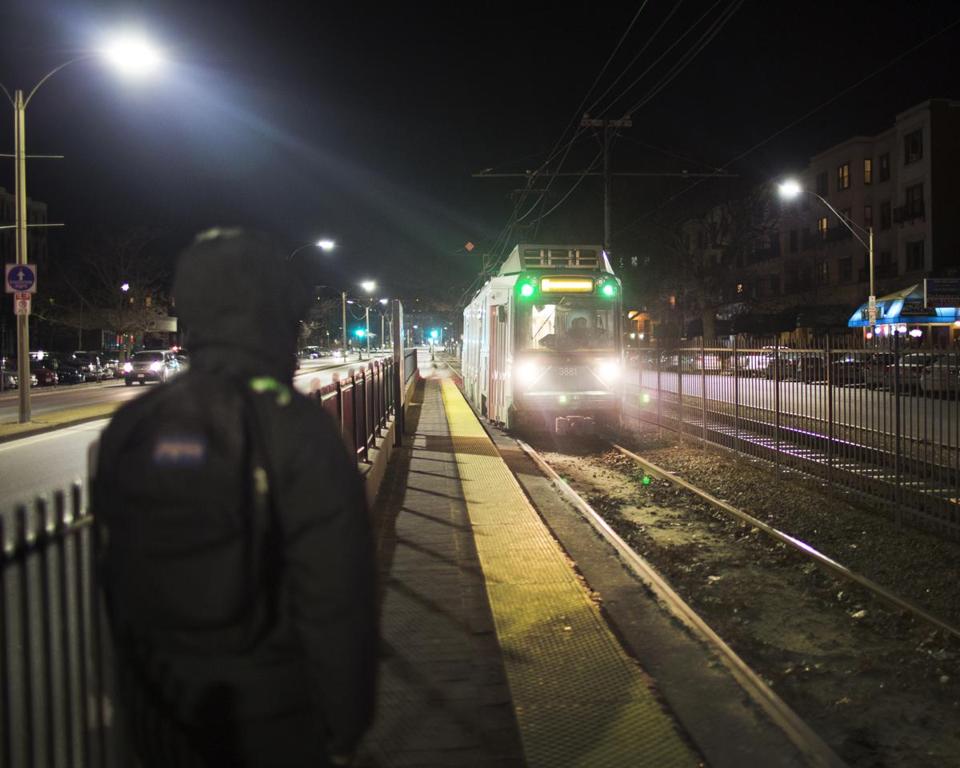
Cutting late-night T service could impact minority, low-income riders
January 22, 2016
Boston Globe | By Adam Vaccaro | 01.19.16
 Eliminating late-night weekend T service might have a disproportionate effect on low-income and minority riders, a transit official said Tuesday.
Eliminating late-night weekend T service might have a disproportionate effect on low-income and minority riders, a transit official said Tuesday.
The Massachusetts Bay Transportation Authority is required by the federal law to run an “equity analysis” to see whether any planned service changes would have a greater impact on low-income or minority riders than other parts of the population. The MBTA’s governing board has indicated it is leaning toward cutting late-night service, which costs $14 million per year, as it seeks to plug a budget gap of $242 million next year.
Speaking at the first of three public hearings about the planned cut, MBTA Assistant General Manager Charles Planck said the initial findings from the T’s analysis of the late-night cut indicates inequitable results.
Planck said that if the analysis shows the change would have that effect, the T must consider—though it would not necessarily need to implement—lower-cost alternatives to the existing service before cutting it. The late-night service keeps trains and some buses running about 90 minutes later on early Saturday and Sunday mornings.
“If there is such an impact, you determine whether there are reasonable and practical mitigating changes you can make to service and to fares,” he said in an interview after the hearing. “Sometimes there are not reasonable and practical changes that can be made, so that decision is ahead of us.”
Asked whether the T would still cut the late-night service if the analysis shows a disproportionate impact, Planck said, “That determination is ahead of us.” Planck added the T has concerns about the reliability of the data used for the equity analysis.
According to Federal Transit Administration guidelines, agencies can only implement service changes that show a “disparate impact” on minority riders if the agency has a “substantial legitimate justification for the proposed service change,” and it can show no alternative would have a lower impact while still accomplishing the agency’s goals in eliminating the service. And impacts on low-income riders must be minimized or mitigated “where practicable.”
So far, Planck said, the MBTA “has not designed any alternative” to the current late-night bus and subway service but is asking the public for ideas as part of the hearings. The agency could also consider contracting late-night service out to private providers.
If broached, that idea could face a separate challenge. Jim O’Brien, the president of the Boston Carmen’s Union, which represents MBTA drivers, said he understands ending the service to save money. But, he said, “we oppose any privatization.”
Late-night service was launched in 2014. Past surveys have shown most riders use the service for entertainment or social purposes, followed by work-related reasons.
Average late-night ridership has fallen off from the time it launched, from about 16,000 to 13,000 per night, Planck said. The hours were scaled back in mid-2015, with subway trips ending at 2 a.m. rather than 2:30, and several late-night bus routes were cut.
Officials have said they are considering cutting the service because ridership is lower than expected, the private sector hasn’t provided as much money to fund the operation as expected, and running the service limits overnight maintenance work.
“I understand the MBTA needs to make cuts, but students of Boston rely too much on this service for it to be taken away,” Logan Trupiano, a Suffolk University freshman who said he uses late-night transit on a “weekendly” basis, told officials at the hearing. “Boston is the number one college city in America. We should continue to progress and promote young people living in our city with great services like the late-night transportation.”
Trupiano said he felt more students would have turned out to voice a similar opinion if the 10 a.m. meeting had occurred earlier.
“We’re college students,” he said. “We don’t like to wake up too early.”
Marilyn, a Dorchester resident who lives near the Red Line tracks and who declined to provide her last name, had a different perspective on the late-night program.
“As we hear the steel wheels on the train go ‘round and ‘round all through the community’s backyards, we do not sleep,” she said. “We are asking that you do not continue the service so that we may sleep.”
One of a handful of residents to speak at the hearing, Marilyn argued services like Uber and Lyft have filled the need for late-night transportation.
Further hearings on the late-night service will be held Tuesday evening at 5 p.m. and Wednesday night in Cambridge. The T is also accepting feedback online through February 12.
The T previously ran a “Night Owl” bus-only service for four years before it was shut down due to low ridership in 2005.
Adam can be reached at adam.vaccaro@globe.com. Follow him on Twitter at@adamtvaccaro.


Recent Comments